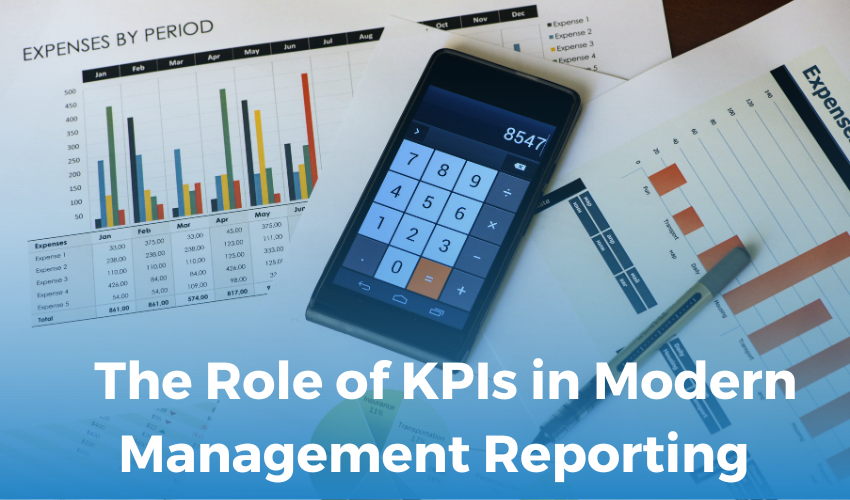

31-10-23
In today's fast-paced business environment, effective management reporting is crucial for organizations to make informed decisions and stay competitive. Key Performance Indicators (KPIs) play a pivotal role in this process, enabling companies to monitor, measure, and manage their performance. KPIs provide valuable insights into various aspects of an organization's operations, helping leaders make data-driven decisions and track progress towards their goals. In this blog, we'll explore the significance of KPIs in modern management reporting, their benefits, and how to design an effective KPI framework.
Understanding Key Performance Indicators (KPIs)
Key Performance Indicators, often abbreviated as KPIs, are specific, quantifiable metrics that help organizations assess their performance in various areas. These metrics are derived from a company's strategic objectives and provide a snapshot of how well the organization is progressing towards its goals. KPIs can cover a wide range of functions, from financial metrics like revenue and profit margins to operational metrics like customer satisfaction and employee productivity.
The Importance of KPIs in Modern Management Reporting
Data-Driven Decision Making: KPIs provide objective data on an organization's performance. Managers can rely on these metrics to make informed decisions rather than relying on gut feelings or anecdotal evidence. This data-driven approach leads to more effective and efficient decision-making.
Goal Alignment: KPIs are directly tied to an organization's strategic objectives. They help ensure that everyone in the organization is working towards the same goals. When KPIs are consistently tracked and communicated, it creates a shared vision and sense of purpose among team members.
Performance Monitoring: KPIs enable organizations to track their performance over time. By comparing current and historical data, management can identify trends, spot areas in need of improvement, and recognize when goals are being met or exceeded.
Early Problem Detection: KPIs can act as an early warning system. If a KPI starts to underperform, it can alert management to potential issues, allowing for timely intervention before problems escalate.
Accountability and Responsibility: KPIs can be assigned to specific teams or individuals, promoting accountability within the organization. When individuals are responsible for specific KPIs, it becomes clear who is contributing to the achievement of goals and who needs support or improvement.
The Benefits of Implementing KPIs in Modern Management Reporting
Implementing KPIs in management reporting offers several tangible benefits:
Improved Efficiency: KPIs help organizations identify inefficiencies and areas where resources can be reallocated for better results.
Better Decision Making: With reliable data at their fingertips, leaders can make decisions that are based on facts rather than conjecture.
Increased Productivity: KPIs can motivate employees to improve their performance and contribute to the company's success. The knowledge that their efforts are being measured can be a powerful incentive.
Enhanced Communication: KPIs facilitate better communication within the organization. By sharing performance data regularly, everyone remains aligned with the company's objectives.
Strategic Adaptability: In a rapidly changing business environment, KPIs help organizations adapt to new challenges. They can shift focus and resources to respond to emerging trends and opportunities.
Designing an Effective KPI Framework
To harness the power of KPIs in modern management reporting, it's essential to design a robust KPI framework. Here are the key steps: Be sure that each KPI directly aligns with a strategic goal.
Choose Relevant Metrics: Select metrics that are relevant to your objectives. Avoid the trap of tracking too many KPIs; focus on the most critical ones. It's better to monitor a few key metrics thoroughly than many superficially.
Establish Baselines: To measure progress, establish a baseline for each KPI. This baseline represents the starting point against which you will track changes and improvements.
Set Targets: Define realistic targets for each KPI. These targets should be ambitious but attainable. They provide a clear sense of what success looks like.
Assign Responsibility: Specify who in the organization is responsible for each KPI. This ensures accountability and empowers individuals or teams to take ownership of their performance.
Collect and Analyze Data: Implement systems and processes for data collection. Regularly analyze the data to track performance against targets and identify trends and outliers.
Communicate KPIs: Make KPIs visible throughout the organization. Regularly share progress and discuss performance in team meetings to ensure everyone is aware of the organization's status.
Review and adjust: Periodically review your KPIs and the entire framework. If you find that certain KPIs are no longer relevant or need adjustment, be flexible in your approach.
Challenges and Considerations
While KPIs are undeniably valuable, there are some common challenges and considerations to keep in mind:
Choosing the Right KPIs: Selecting the most relevant KPIs can be challenging. It's essential to strike a balance between tracking critical metrics and not overwhelming the organization with too many.
Data Accuracy: Ensure that the data used for KPIs is accurate and reliable.
Avoiding "KPI Fatigue": Overloading employees with too many KPIs can lead to burnout and decreased morale. Focus on the most critical metrics to maintain engagement.
Adaptability: KPIs should be flexible to adapt to changing circumstances and evolving business strategies. A rigid KPI framework may hinder an organization's ability to respond to new challenges.
Conclusion
KPIs are indispensable tools for modern management reporting in the USA. They enable organizations to make data-driven decisions, monitor progress, and align their efforts with strategic goals. By designing an effective KPI framework, organizations can harness the power of these metrics to drive efficiency, productivity, and success. However, it's crucial to choose the right KPIs, ensure data accuracy, and maintain flexibility to adapt to the ever-changing business landscape. When leveraged effectively, KPIs can be a driving force behind an organization's growth and prosperity in the modern business world.
Read more : The Benefits of Outsourcing Your Receivables Management
Tags :













































.jpg)
.jpg)
.jpg)
.jpg)


).jpg)














 Get A Quote
Get A Quote
Leave A Comment